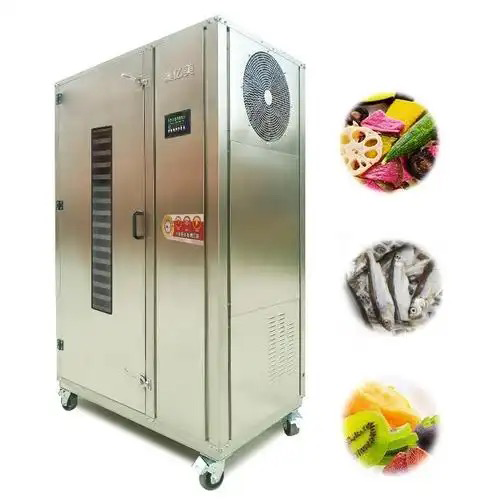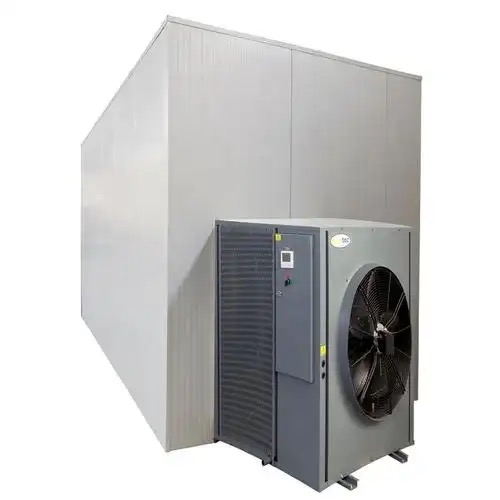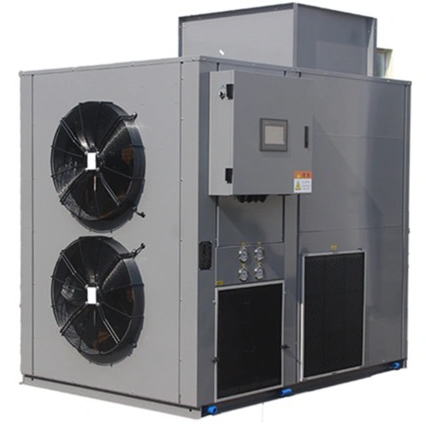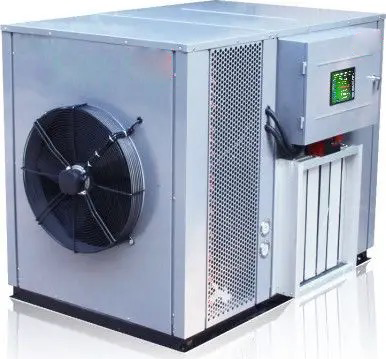
Content Menu
● Understanding Heat Pump Dryers
● How Heat Pump Dryers Work
● Advantages of Full-Size Heat Pump Dryers
>> 1. Energy Efficiency
>> 2. Gentle Drying Process
>> 3. Versatility
>> 4. Space-Saving Design
>> 5. Reduced Environmental Impact
● Applications of Heat Pump Dryers in Food Processing
● Cost Considerations
● Choosing the Right Heat Pump Dryer
● Maintenance Tips for Heat Pump Dryers
● Case Studies: Success Stories with Heat Pump Dryers
>> Case Study 1: Fruit Processing Company
>> Case Study 2: Herb Drying Facility
● Conclusion
● Frequently Asked Questions
>> 1. What is the main advantage of using a heat pump dryer for food?
>> 2. Can heat pump dryers handle large volumes of food?
>> 3. How do heat pump dryers compare to traditional dryers?
>> 4. What types of food can be dried using a heat pump dryer?
>> 5. What maintenance is required for heat pump dryers?
In recent years, the demand for efficient and sustainable drying solutions has surged, particularly in the food processing industry. As a manufacturer of food dryers in China, we understand the importance of providing high-quality OEM services to international brands, wholesalers, and producers. This article explores the benefits of investing in a full-size heat pump dryer, particularly for food drying applications, and how it can enhance your operations.

Understanding Heat Pump Dryers
Heat pump dryers are a modern solution for drying various products, including food items. Unlike traditional dryers that expel hot air, heat pump dryers recycle the air within the system, making them more energy-efficient. They work by using a refrigeration cycle to extract moisture from the air, which is then condensed and removed, allowing for a more controlled drying environment.
How Heat Pump Dryers Work
1. Air Circulation: The dryer draws in ambient air, which is then heated by a compressor.
2. Moisture Extraction: The warm air is circulated through the drying chamber, where it absorbs moisture from the food.
3. Condensation: The moisture-laden air is then passed through a heat exchanger, where it cools down, causing the moisture to condense into water.
4. Recycling: The dry air is reheated and recirculated back into the drying chamber, continuing the process until the desired moisture content is achieved.
Advantages of Full-Size Heat Pump Dryers
1. Energy Efficiency
One of the most significant advantages of heat pump dryers is their energy efficiency. They consume significantly less energy compared to traditional dryers, making them an environmentally friendly option. This is particularly important for food processing facilities that operate on tight margins and need to minimize operational costs. By utilizing a heat pump dryer, businesses can reduce their energy consumption by up to 65%, leading to substantial savings over time.
2. Gentle Drying Process
Heat pump dryers operate at lower temperatures, which helps preserve the quality of the food being dried. This gentle drying process prevents the degradation of nutrients and flavors, ensuring that the final product retains its quality. This is crucial for businesses that prioritize high-quality food products. For instance, when drying fruits, the lower temperatures help maintain their vibrant colors and natural sweetness, making them more appealing to consumers.
3. Versatility
Full-size heat pump dryers can handle a wide range of food items, from fruits and vegetables to meats and herbs. This versatility makes them an excellent investment for food manufacturers looking to diversify their product offerings. For example, a single heat pump dryer can be used to dry apples, tomatoes, and even herbs like basil, allowing businesses to maximize their equipment usage.
4. Space-Saving Design
Many heat pump dryers are designed to be compact and stackable, making them ideal for facilities with limited space. This allows businesses to maximize their production capacity without requiring extensive floor space. In addition, the ability to stack units can lead to increased efficiency in operations, as multiple drying processes can occur simultaneously.
5. Reduced Environmental Impact
By using less energy and producing less waste heat, heat pump dryers contribute to a lower carbon footprint. This aligns with the growing trend of sustainability in the food industry, where consumers are increasingly concerned about the environmental impact of their food choices. Companies that adopt eco-friendly practices, such as using heat pump dryers, can enhance their brand image and appeal to environmentally conscious consumers.

Applications of Heat Pump Dryers in Food Processing
Heat pump dryers are suitable for various food processing applications, including:
1. Fruit Drying: Ideal for drying fruits like apples, bananas, and berries while preserving their natural flavors and nutrients.
2. Vegetable Drying: Effective for dehydrating vegetables, which can be used in soups, stews, and snacks.
3. Herb Drying: Perfect for drying herbs like basil, thyme, and oregano, maintaining their aromatic properties.
4. Meat Drying: Suitable for producing jerky and other dried meat products, ensuring safety and quality.
Cost Considerations
While the initial investment in a full-size heat pump dryer may be higher than traditional drying methods, the long-term savings in energy costs and improved product quality can offset this expense. Businesses should consider the following factors when evaluating the cost-effectiveness of heat pump dryers:
1. Energy Savings: Calculate the potential savings on energy bills over time. For instance, if a traditional dryer costs $1,000 annually to operate, a heat pump dryer might reduce that cost to $350, resulting in significant savings.
2. Product Quality: Assess the value of higher-quality products that can command better prices in the market. Dried fruits and vegetables that retain their color and flavor can be sold at a premium.
3. Operational Efficiency: Consider the reduced labor and maintenance costs associated with automated drying processes. Heat pump dryers often require less manual intervention, allowing staff to focus on other critical tasks.
Choosing the Right Heat Pump Dryer
When selecting a heat pump dryer for your food processing needs, consider the following factors:
1. Capacity: Ensure the dryer can handle your production volume. A larger capacity dryer may be necessary for businesses with high output.
2. Temperature Control: Look for models with precise temperature control to optimize the drying process. This feature is essential for maintaining the quality of sensitive products like herbs and fruits.
3. Ease of Use: Choose a dryer with user-friendly controls and automation features. Intuitive interfaces can reduce training time for staff and improve operational efficiency.
4. Durability: Invest in a machine made from high-quality materials to withstand the rigors of food processing. Stainless steel components are often preferred for their longevity and ease of cleaning.
Maintenance Tips for Heat Pump Dryers
To ensure the longevity and efficiency of your heat pump dryer, follow these maintenance tips:
1. Regular Cleaning: Keep the filters and heat exchangers clean to maintain airflow and efficiency. Clogged filters can significantly reduce the dryer’s performance.
2. Check Seals: Inspect door seals and gaskets for wear and tear to prevent air leaks. Proper sealing is crucial for maintaining the dryer’s efficiency.
3. Monitor Performance: Regularly check the dryer’s performance and address any issues promptly. Early detection of problems can prevent costly repairs and downtime.
Case Studies: Success Stories with Heat Pump Dryers
Case Study 1: Fruit Processing Company
A fruit processing company in California switched from traditional drying methods to a full-size heat pump dryer. They reported a 50% reduction in energy costs and an increase in product quality, leading to a 20% increase in sales. The ability to dry fruits at lower temperatures preserved their natural sweetness and color, making them more appealing to consumers.
Case Study 2: Herb Drying Facility
An herb drying facility in Oregon implemented heat pump dryers to enhance their operations. They found that the gentle drying process allowed them to maintain the aromatic properties of their herbs, resulting in higher customer satisfaction. The facility also noted a significant decrease in drying time, allowing them to process more batches daily.
Conclusion
Investing in a full-size heat pump dryer is a strategic decision for food manufacturers looking to enhance their drying processes. With their energy efficiency, gentle drying capabilities, and versatility, these dryers can significantly improve product quality while reducing operational costs. As the food industry continues to evolve, adopting innovative technologies like heat pump dryers will be essential for staying competitive.

Frequently Asked Questions
1. What is the main advantage of using a heat pump dryer for food?
The main advantage is energy efficiency, which leads to lower operational costs and better preservation of food quality.
2. Can heat pump dryers handle large volumes of food?
Yes, full-size heat pump dryers are designed to accommodate large volumes, making them suitable for commercial food processing.
3. How do heat pump dryers compare to traditional dryers?
Heat pump dryers are more energy-efficient, operate at lower temperatures, and provide better quality drying compared to traditional dryers.
4. What types of food can be dried using a heat pump dryer?
Heat pump dryers can be used for fruits, vegetables, herbs, and meats, making them versatile for various food processing applications.
5. What maintenance is required for heat pump dryers?
Regular cleaning of filters, checking seals, and monitoring performance are essential for maintaining a heat pump dryer.












